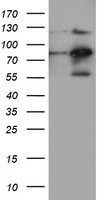PSMA (FOLH1) Mouse Monoclonal Antibody [Clone ID: OTI2E1]
CAT#: CF504509
Carrier-free (BSA/glycerol-free) FOLH1 mouse monoclonal antibody, clone OTI2E1 (formerly 2E1)
Formulation: Standard
Other products for "FOLH1"
Specifications
| Product Data | |
| Clone Name | OTI2E1 |
| Applications | ELISA, IF, WB |
| Recommended Dilution | WB 1:500~2000, IF 1:100 |
| Reactivities | Human, Monkey, Mouse, Rat, Dog |
| Host | Mouse |
| Isotype | IgG2b |
| Clonality | Monoclonal |
| Immunogen | Full length human recombinant protein of human FOLH1(NP_004467) produced in HEK293T cell. |
| Formulation | Lyophilized powder (original buffer 1X PBS, pH 7.3, 8% trehalose) |
| Reconstitution Method | For reconstitution, we recommend adding 100uL distilled water to a final antibody concentration of about 1 mg/mL. To use this carrier-free antibody for conjugation experiment, we strongly recommend performing another round of desalting process. (OriGene recommends Zeba Spin Desalting Columns, 7KMWCO from Thermo Scientific) |
| Purification | Purified from mouse ascites fluids or tissue culture supernatant by affinity chromatography (protein A/G) |
| Conjugation | Unconjugated |
| Storage | Store at -20°C as received. |
| Stability | Stable for 12 months from date of receipt. |
| Predicted Protein Size | 84.2 kDa |
| Gene Name | Homo sapiens folate hydrolase 1 (FOLH1), transcript variant 1, mRNA. |
| Database Link | |
| Background | This gene encodes a type II transmembrane glycoprotein belonging to the M28 peptidase family. The protein acts as a glutamate carboxypeptidase on different alternative substrates, including the nutrient folate and the neuropeptide N-acetyl-l-aspartyl-l-glutamate and is expressed in a number of tissues such as prostate, central and peripheral nervous system and kidney. A mutation in this gene may be associated with impaired intestinal absorption of dietary folates, resulting in low blood folate levels and consequent hyperhomocysteinemia. Expression of this protein in the brain may be involved in a number of pathological conditions associated with glutamate excitotoxicity. In the prostate the protein is up-regulated in cancerous cells and is used as an effective diagnostic and prognostic indicator of prostate cancer. This gene likely arose from a duplication event of a nearby chromosomal region. Alternative splicing gives rise to multiple transcript variants encoding several different isoforms. [provided by RefSeq] |
| Synonyms | FGCP; FOLH; GCP2; GCPII; mGCP; NAALAD1; NAALAdase; PSM; PSMA |
| Reference Data | |
| Protein Families | Druggable Genome, Protease, Transmembrane |
Documents
| Product Manuals |
| FAQs |
Resources
| Antibody Resources |
{0} Product Review(s)
0 Product Review(s)
Submit review
Be the first one to submit a review
Product Citations
*Delivery time may vary from web posted schedule. Occasional delays may occur due to unforeseen
complexities in the preparation of your product. International customers may expect an additional 1-2 weeks
in shipping.






























































































































































































































































 Germany
Germany
 Japan
Japan
 United Kingdom
United Kingdom
 China
China








